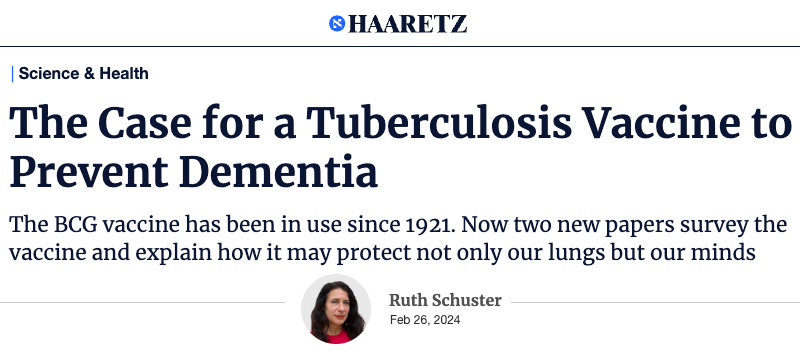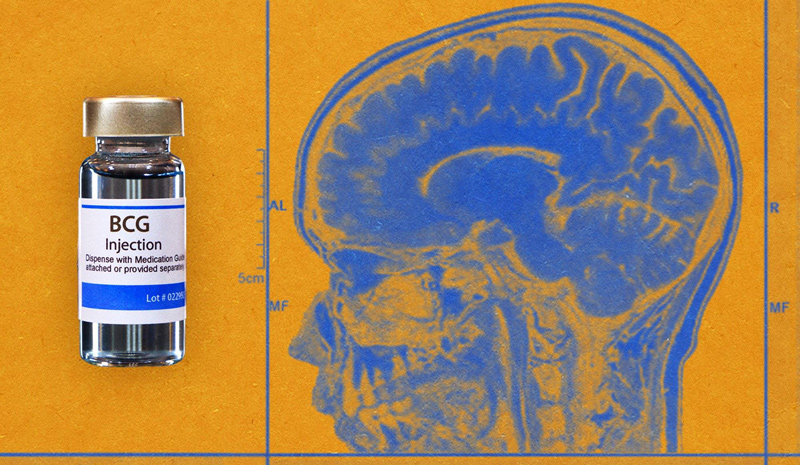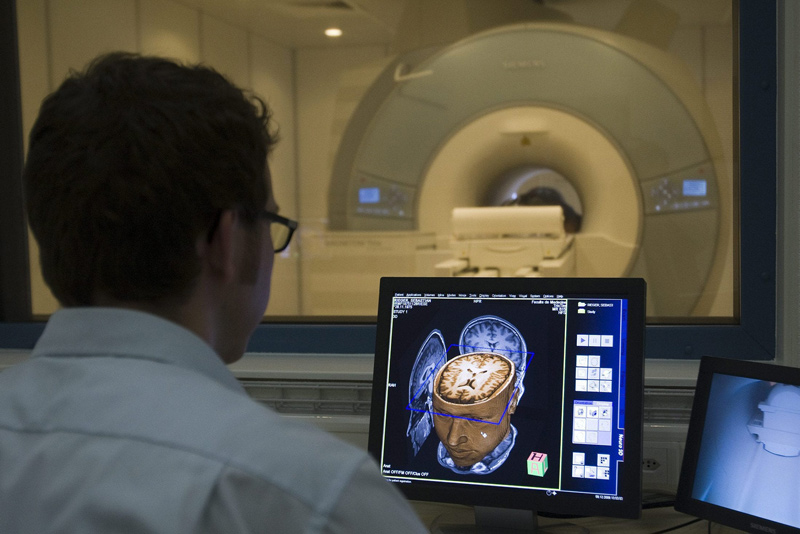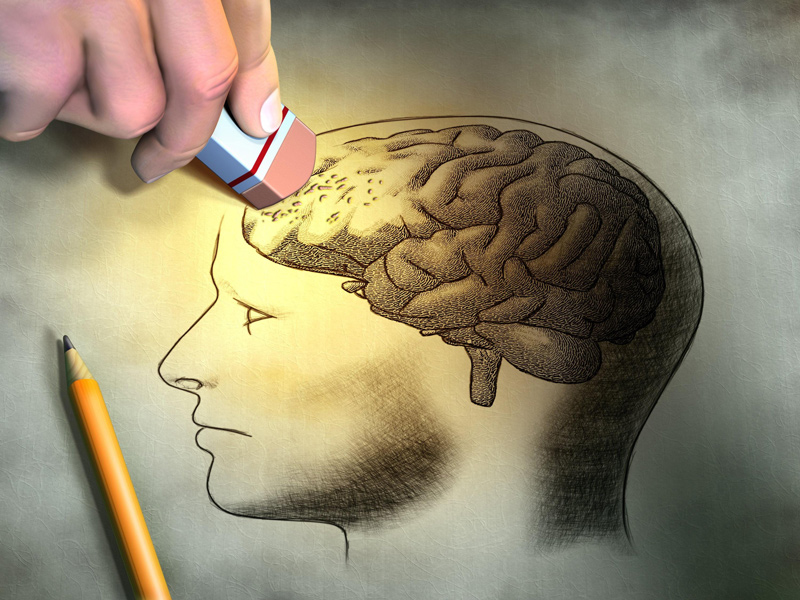

We still don’t know what causes Alzheimer’s. We don’t know how to reverse it, let alone cure it. It can’t even be categorically diagnosed until autopsy, and its progress seems inexorable. Yet even without understanding it completely, Alzheimer’s – and certain other degenerative diseases – can apparently be prevented by a vaccine that already exists: Bacillus Calmette-Guérin, developed to fight tuberculosis in the early 1900s.
Fighting Alzheimer’s with the help of a TB preventative may not sound obvious, but the proof of the pudding is in eating it and remembering it too. Why it works is a question, but if it does?
BCG is a live vaccine: a weakened strain of bovine (not human) tuberculosis. It was introduced in 1921 and got off to a rocky start. Today, its efficacy has been acknowledged beyond merely teaching our immune system to identify tuberculosis-causing bacteria. Because of its generalized immune system-stimulating characteristics, BCG is the accepted treatment for superficial bladder cancer. And it is there where the medical establishment discovered those bladder cancer survivors who had been treated with BCG had lower rates of Alzheimer’s and another neurodegenerative condition, Parkinson’s disease.
Other studies at Harvard and the University of Rome established BCG’s benefit by injection in juvenile diabetes and multiple sclerosis. More amazingly, a Greek-Dutch group found that BCG prevented recurrence of lung disease in elderly patients on hospital discharge after bouts of pneumonia.
How BCG achieves this has been unclear. Now, in a set of two papers to be published in the Journal of Alzheimer’s Disease (which has published the abstracts), Prof. Emeritus Charles Greenblatt of Hebrew University and Prof. Richard Lathe of the University of Edinburgh Medical School survey what we know of BCG, and urge the case for adult vaccination.

The first paper describes the history of discovering that some vaccines against specific diseases can have nonspecific effects as well, by “training” the immune system. The second paper is a critical review of studies linking between BCG, some other vaccines, and protection against the development of dementia and, incidentally, other conditions.
The effect of BCG on the prevention of recurrent pneumonia in discharged elderly patients is also remarkable, they observe as well.
This is some vaccine. Prevention could be a blessing in our aging world, where dementia rates are climbing. The World Health Organization says 55 million people had been diagnosed with dementia as of 2020 – a number that’s probably way too low and in any case is expected to more than double by the year 2050, according to Alzheimer’s Disease International.
The blessings of TB
BCG’s nonspecific wondrousness was first observed in 1930 by the doctor and immunologist Albert Calmette. Administering it to babies in parts of Europe did more than prevent TB deaths: it as much as halved general infant mortality, according to Danish scientists working in Africa, who have been focusing on the vaccine as a preventative for Alzheimer’s and Parkinson’s Disease since 2019.

In 1924, smallpox vaccine was found to also protect against herpes – lucky for the rabbits being tested. Two years later, it was observed that a smallpox shot apparently helped herpes lesions regress in some people. Nor was cross-protection peculiar to pox and herpes viruses. Polio vaccine also has shown therapeutic effects against herpes, which has been documented in the literature.
Much work was done over the decades, which the duo describes in loving detail – including the 1929 observation by Raymond Pearl at Johns Hopkins University Hospital that TB “was not all bad.” That was when he observed that individuals with TB apparently had a lowered risk of developing cancer.

Pearl even claimed that experiments in cancer treatment with tuberculin, a substance from the TB bacterium, were underway. No details were given.
In 1959, 30 years after Pearl’s observation, BCG was shown to be an adjuvant that retarded or prevented cancer development in mice injected with cancer cells, paving the way for the discovery that when administered to elderly patients, this remarkable vaccine might help stave off dementia. Instead, come 2019, a team at the Hebrew University and Hadassah Hospital headed by Prof. Ofer Gofrit, chief of the Urology Department, would report that giving BCG to bladder cancer patients substantially reduced their risk of developing Alzheimer’s.
The Jerusalem anomaly
What is BCG, anyway? Bacillus Calmette-Guérin is a weakened form of Mycobacterium bovis, the bacteria that cause TB. The enfeebled strain is called after Calmette and his fellow bacteriologist Camille Guérin.
Being a weakened strain, it primes baby’s immune system to recognize and fight TB strains, thus helping to prevent severe disease. But it also has a general stimulatory effect, called immunopotentiation – conferring nonspecific protection, Greenblatt and Lathe explain.
Do BCG’s beneficial effects require it to colonize us, living inside forever more (“long-term persistence of live bacteria”)? Infection with full-blown tuberculosis bacteria can apparently be life-long, even after treatment. Maybe the weakened Bacille, BCG, once administered, also helpfully lurks inside.
Two studies – one a 60-year follow-up of BCG inoculation of Native Americans and Alaskans, and one monitoring Norwegians – suggests it does stick around for decades. It may be coyly hiding in the brain. Also, as Greenblatt and Lathe point out: “BCG revaccination offers no apparent improvement in protection against TB,” which implies that once you get the shot, its effect persists.
This would imply that once one gets a BCG shot against tuberculosis as a kiddie, one has diminished risk of Alzheimer’s in old age. That in turn would imply that Alzheimer’s rates should be lower in the developing world than in the developed, because BCG is still being used in the former but not the latter (because they figure TB has been beaten there).
Indeed, Alzheimer’s rates seem to be lower in the developing world than in the developed, though of course this could have other reasons – including that the developed world is a freak for bleach, while the developing world features more free-range microbes training our immune systems.

Graham Rook, a proponent of replacing the “hygiene hypothesis with the loss of ‘old friends’ (or loss of biodiversity’)” relates the story of a group of Russian dirt farmers who move to Finland. In Russia, autoimmune diseases were not their lot, but in clean sterile Finland they got them all.
The Finnish Karelians (whose living conditions are considered significantly more modern compared with those of Russian Karelians) exhibited a fourfold higher prevalence of childhood atopy and a sixfold higher prevalence of T1D [type-1 diabetes] than the Karelians on the Russian side of the border.
So, sparkling home bad, squalor good? All things in moderation, and that is a story for another day. Back to BCG, which was the vaccine used against TB in Israel until the 1980s, Greenblatt says. “It wasn’t used uniformly though – it wasn’t used in Jerusalem.”
It wasn’t? No, because Hadassah ruled the roost there and BCG was not used in the United States, where Hadassah resided, so no BCG inoculations for Jerusalem. Interestingly, dementia rates in Israel began to increase at about the time that BCG use ended, he says.
Their second paper is devoted to the molecular evidence that immunopotentiation by BCG and other vaccines, including Shingrix against shingles, can protect against neurodegeneration.
Again we stress, Greenblatt and Lathe are not suggesting that strengthening the immune system will reverse degenerative diseases, nor that they will help everybody. This is a mutated bacteria operating in biological systems involving practically infinite parameters, not the microbial Santa Claus. They are advocating for intensive research ahead of a potential adult vaccination program to possibly defer the evil day.
“Don’t think of a cure for amyloids,” Greenblatt counsels by phone, referring to plaque clots in the brain that are widely assumed to be associated with Alzheimer’s: “Think prevention.”
Boxer brain
Greenblatt has great faith in the prophylactic potential of BCG. It isn’t the only generalized stimulant for the immune system, but it stands out among adjuvants, he explains.
The original publication from Hebrew University-Hadassah that renewed interest in immunotherapy for dementia found that bladder cancer patients who were injected with BCG and tracked over decades (from the 1980s) had a roughly 78 percent reduction in dementia rates. Independent work later confirmed the result with a reduction rate of up to 50 percent. Still better than 0 percent.
Although they focus primarily on BCG, they stressed that a great number of different microbes and molecules can boost immunity, but mycobacteria and BCG in particular appear to be special in this regard, they say.
Theoretically at least, when might a prophylactic shot of BCG be appropriate? Maybe sooner than later. “I have a feeling that once the Alzheimer’s changes in the brain dig in, it’s hard to stop them,” Greenblatt answers by email. “However, when do they really start? The football player has his concussion at 21 and the boxer about the same time, but their dementia may start 50 years later. Old inflammation, from toxoplasma as a baby, does it hang around even though hydrocephalus doesn’t occur? Many fungi, bacteria, protozoa, prions hang around and certainly some inflammation is the natural reaction, and part of it is the amyloid” – clumps of protein that form in the brain and are believed to disrupt its function.
Though his work has been focusing on BCG, Greenblatt is an ardent advocate of adult vaccination in general. “If I was head of one of our health maintenance organizations, anti-vaxxers or not shouting outside the clinic, I would bring in everyone over 60 and check them out for their anti-shingles, anti-pneumonia, anti-flu, anti-COVID, etc.,” he says. “At the same time, I would be widening the research efforts in old folks’ homes and hospital discharges, to a real massive clinical trial giving BCG by jab and orally.” At the minimum, it might protect the subjects against respiratory tract infections.
So what have we? About 10 percent of today’s aging people develop some form of dementia, statistics indicate. The global population is aging. Among the various adjuvants that stimulate the immune system nonspecifically, BCG seems to be a power player that could help contain the burgeoning global burden of dementia. It wouldn’t be expected to work on all causes of dementia, but if it works even for some, this would be good. It doesn’t even matter what causes Alzheimer’s, which remains debated. How aspirin, a drug introduced in the 1800s, works had remained a mystery until 2023.